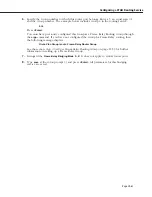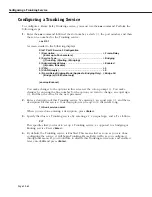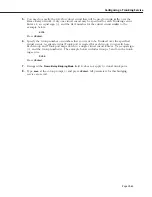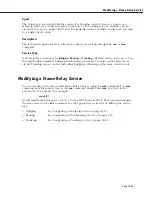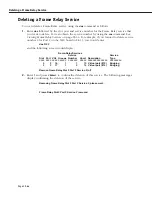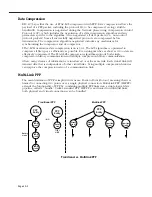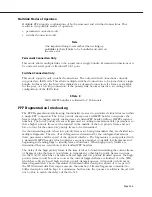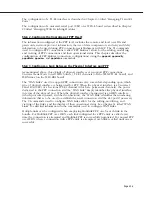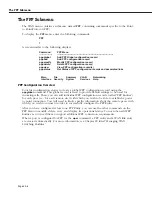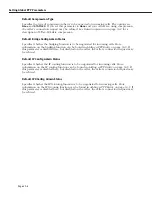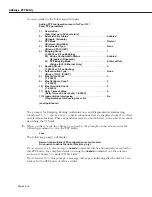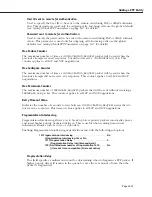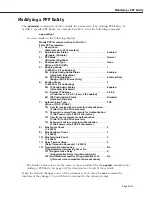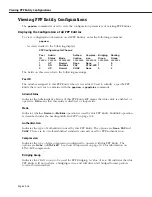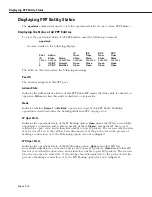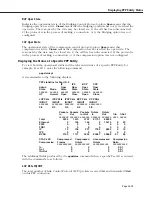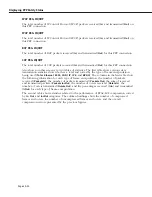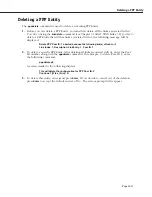
Setting Global PPP Parameters
Page 30-7
Setting Global PPP Parameters
The
pppglobal
command is used to set global configuration parameters that are used by the
PPP protocol. These parameters are termed “global” because they are the default settings used
by the switch to establish connections with incoming calls. These global settings are not tied
to a specific peer (i.e., a PPP Entity; see
Adding a PPP Entity
on page 30-9).
To set the global PPP parameters, enter the following command:
pppglobal
A screen similar to the following displays:
PPP Global Configuration:
1)
Default Authentication Type . . . . . . . . . . . . . . . . . . . . . . . . . PAP
{(N)one, (P)AP, (C)HAP}
2)
Global User ID sent to remote for Authentication. . . . . . . . =
{8 characters userid}
3)
Global Password sent to remote for Authentication . . . . . =
{8 characters password}
4)
Default Compression Type . . . . . . . . . . . . . . . . . . . . . . . . . . = STAC-LZS
{(N)one, STAC-(L)ZS}
5)
Default Bridge Config Admin Status . . . . . . . . . . . . . . . . . . = Disabled
{(E)nable, (D)isable}
6)
Default IP Config Admin Status. . . . . . . . . . . . . . . . . . . . . . . = Enabled
{(E)nable, (D)isable}
7)
Default IPX Config Admin Status . . . . . . . . . . . . . . . . . . . . . = Disabled
{(E)nable, (D)isable}
(save/quit/cancel)
:
The fields on this screen have the following meanings:
Default Authentication Type
Specifies the type of authentication that is to be expected on incoming calls. The options are
None
,
PAP
, and
CHAP
. Set this parameter to the type of authentication that you expect your
callers to be using. If you enable either PAP or CHAP authentication, the next two parameters
must also be set (user ID and password) or the caller’s connection requests will be refused. If
you set this parameter to
None
, you must also set the Default Bridge, IP and IPX
Configuration Administration Status parameters or the caller’s connection requests will be
refused.
Global User ID sent to remote for Authentication
Specifies the user ID that will be sent to a peer on incoming calls. Enter the text you will
transmit on incoming calls. This parameter must contain a value if either PAP or CHAP
authentication is being used. The User ID and password received from the peer will be
checked against the list of peers (PPP Entities) to attempt to identify the remote peer.
Global Password sent to remote for Authentication
Specifies the password that will be sent to a peer on incoming calls. Enter the text you will
transmit on incoming calls. This parameter must contain a value if either PAP or CHAP
authentication is being used.
Summary of Contents for Omni Switch/Router
Page 1: ...Part No 060166 10 Rev C March 2005 Omni Switch Router User Manual Release 4 5 www alcatel com ...
Page 4: ...page iv ...
Page 110: ...WAN Modules Page 3 40 ...
Page 156: ...UI Table Filtering Using Search and Filter Commands Page 4 46 ...
Page 164: ...Using ZMODEM Page 5 8 ...
Page 186: ...Displaying and Setting the Swap State Page 6 22 ...
Page 202: ...Creating a New File System Page 7 16 ...
Page 270: ...Displaying Secure Access Entries in the MPM Log Page 10 14 ...
Page 430: ...OmniChannel Page 15 16 ...
Page 496: ...Configuring Source Route to Transparent Bridging Page 17 48 ...
Page 542: ...Dissimilar LAN Switching Capabilities Page 18 46 ...
Page 646: ...Application Example DHCP Policies Page 20 30 ...
Page 660: ...GMAP Page 21 14 ...
Page 710: ...Viewing the Virtual Interface of Multicast VLANs Page 23 16 ...
Page 722: ...Application Example 5 Page 24 12 ...
Page 788: ...Viewing UDP Relay Statistics Page 26 24 ...
Page 872: ...The WAN Port Software Menu Page 28 46 ...
Page 960: ...Deleting a PPP Entity Page 30 22 ...
Page 978: ...Displaying Link Status Page 31 18 ...
Page 988: ...Displaying ISDN Configuration Entry Status Page 32 10 ...
Page 1024: ...Backup Services Commands Page 34 14 ...
Page 1062: ...Diagnostic Test Cable Schematics Page 36 24 ...
Page 1072: ...Configuring a Switch with an MPX Page A 10 ...
Page 1086: ...Page B 14 ...
Page 1100: ...Page I 14 Index ...



